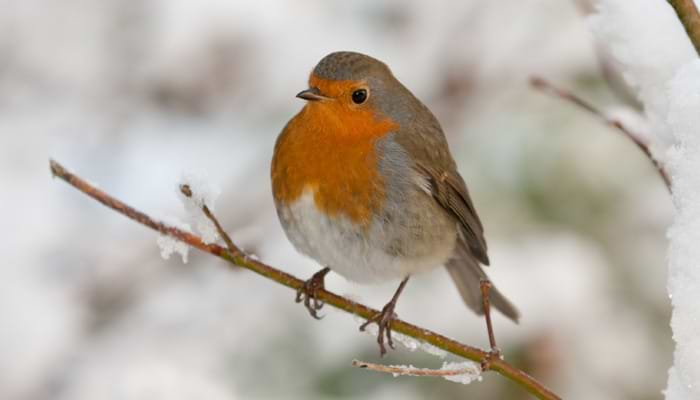
© Gertjan Hooijer / Shutterstock.com
Animal welfare groups are urging people to help protect our wildlife in winter. Animals and birds are at their most vulnerable at this time of year and they need all the help they can get. The RSPCA is encouraging householders to help every species, from birds and frogs to badgers, squirrels, hedgehogs and mice. Scientists say climate change is impacting nature, but not in the way you might think. While we traditionally associate winter with freezing weather, the milder winters, increased rainfall and flooding are having a negative effect on many species. Feeding seabirds The winter of 2019-2020 was the warmest winter across Europe since records began. It also set records for the wettest February and the highest temperature ever recorded in December. In March 2021, the Met Office said winter temperatures higher than 18°C had become more common. Four of the past five winters had recorded such temperatures. The warmer temperatures have adversely affected seabirds. In the North Sea, where the temperature has risen by 1°C in the past 25 years; cold-water fish, including cod, are moving northwards. In addition, the salinity of the warmer surface waters has fallen, and the acidity has increased. This has led to a reduction in the number of corals, phytoplankton and shellfish, as they are struggling to maintain their calcium-rich shells. There has been a shortage of sand eels, a staple of many seabirds' diet, due to the amount of plankton declining. These and other factors have led to a number of horror stories about starving seabirds. If you live in a coastal area, you could be saving their life if you feed them in winter. They will eat almost anything, including food scraps that you might otherwise bin. Garden birds Garden birds traditionally struggle in winter, when food supplies are scarce. They need extra help from householders to survive. Feeding them over winter helps them to stay strong and well until spring. They prefer suet balls, seeds, mealworms, berries and chopped-up fruits such as pears, apples and plums. Keep a store of shop-bought bird food such as seeds, suet balls and nuts, so you can keep bowls and feeder bags well stocked up. Always leave out fresh water for birds in a shallow dish to drink and bathe in. If the weather is freezing, make sure you change the water regularly so it doesn't freeze over. Provide clean bird boxes, and wash feeders and birdbaths regularly to avoid algae build-up - give them a scrub in warm soapy water, making sure you wear rubber gloves for hygiene reasons. Helping mammals While badgers don't hibernate over winter, they tend to sleep a lot, especially during severe weather. They struggle to find their favourite foods, so provide food such as cheese, cooked meats, peanuts and fruit. Help keep squirrels' food stores well-stocked by leaving out various nuts including walnuts, hazelnuts and almonds, plus fruits including chopped apples and vegetables such as carrots, beans and spinach. Squirrels store food and find it to eat later when it's in short supply. Leave out food for hedgehogs including cooked minced meat, tinned dog and cat food (not fish-based) and chopped boiled eggs. Leave a shallow dish of water on the floor for them. Don't leave milk out as it's not good for hedgehogs. You can make a hedgehog home by providing a waterproof "house", such as a plastic container with a lid and a door-hole cut out. Hedgehogs will fill it with leaves and other foliage to make a warm, comfy den. Hedgehogs usually hibernate for much of a cold winter, so if you see one out during the day, it may be sick and require a trip to a wildlife hospital. Small mammals such as mice will eat mixed seeds, small nuts and chopped fruit. Helping insects While you may not particularly like insects, they are a part of the food chain and also part of your garden's vital ecosystem. Help them to survive winter by leaving fallen leaf piles in your garden, under shrubs and hedges - they provide a safe haven for wintering insects. Don't prune healthy herbaceous plants until early spring, as they provide winter shelter for various insects. If you have already pruned your herbaceous borders, bundle the stems together and leave them in secluded spots for ladybirds and beetles to take shelter. Helping pond life Don't leave the surface of your pond frozen over in winter, as frogs may be hiding at the bottom. During the winter, check your garden pond every morning for signs of ice. When the surface ices over, it can allow toxic gases to build up underneath, harming the pond life, including fish. If the pond freezes over, don't break the ice with a hammer or tip boiling water in it, as this can harm the inhabitants. Fill a saucepan with hot water and hold it on the pond's surface to carefully melt a hole. Don’t forget to wrap up warm in your winter woollies! Wild garden Let your garden grow a little wild over winter. Leave your grass long, cultivate your compost heap and add a log pile, as these environments can create a haven for hidden wildlife in cold weather. You're unlikely to see butterflies in winter and perhaps don't give them a second thought. While they don't hibernate, they stay alive in colder weather by entering a period of dormancy. It's not strictly hibernation, but they are inactive. They will find somewhere dry to shelter such as a hollow tree, a woodpile or a garden shed, so it's preferable to leave them alone until spring, should you find one in your garden. It's very easy to make a difference to the UK's struggling wildlife this winter by carrying out a few simple steps. It can also be good for people to get outdoors and have a go at turning their garden space into a wildlife haven. Do something good today: pop your wellies on and get cracking!




